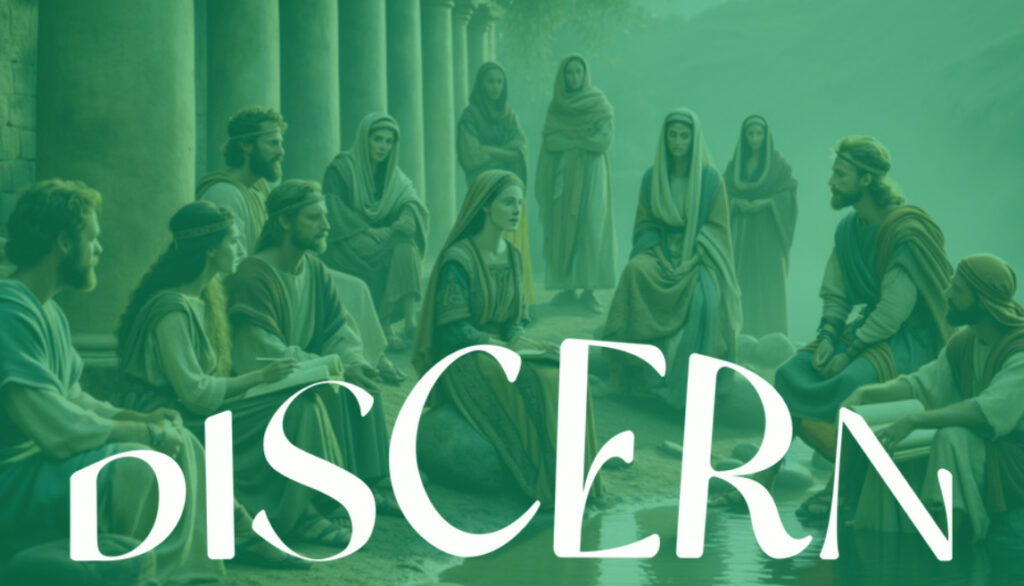
In our journey through life, we encounter numerous crossroads that require us to make choices, often challenging our sense of direction and purpose. The concept of discernment, rooted in the Latin word “discernere,” encapsulates the intricate process of sifting through options, perceptions, and potential paths to determine the right course of action. For Christians, discernment is not just a practical skill; it is a spiritual imperative that aligns closely with understanding and executing God’s will.
The dual nature of discernment combines analytical reasoning with intuitive spiritual insight. This balance is essential, involving a rational evaluation of our circumstances and a keen spiritual sensitivity to the whispers of the Holy Spirit. Engaging both mind and heart, discernment transcends mere intellectual exercise, evolving into a quest for divine wisdom and guidance.
This spiritual journey leads us to make choices that resonate with God’s desires, transcending personal preferences or logical reasoning. Every decision becomes a reflection of a higher purpose, connecting our earthly journey with eternal objectives. However, this path is strewn with obstacles. The distractions of daily life, the waning influence of traditional church structures, and the rapid shifts in cultural values often dilute our spiritual focus, leading to a superficial faith experience.
The modern Christian faces a stark reality: a disconnection from deep, gospel-centered understanding and the challenge of living out timeless biblical principles in a constantly changing world. Issues like technology, social media, and social justice demand a fresh application of these ancient teachings, urging believers to actively engage with the world while remaining rooted in the gospel.
Amidst these challenges lies a call to discern our unique role in manifesting the Kingdom of God in every aspect of life. The prophet Jeremiah’s words, “Before I formed you…I set you apart…” (Jeremiah 1:5), remind us of God’s intimate knowledge and purpose for each of us. Just as Jeremiah was chosen for a specific mission, we too are equipped and called to fulfill God’s divine plan for our lives.
The mystery of God’s grace is further revealed through the incarnation of Christ, who chose to dwell among us, imbuing us with the fullness of His grace and truth. This divine presence within us is not passive but a dynamic force, enriching our lives with the essence of Christ. The apostle Paul affirms this, stating that in Christ are hidden all the treasures of wisdom and knowledge (Colossians 2:3).
Being filled with Christ equips us with an unparalleled depth of discernment, allowing us to see through the lens of divine wisdom. This spiritual clarity guides our decisions, shapes our interactions, and molds our character, enabling us to navigate life’s complexities with moral and ethical integrity.
For those called to specific outreach fields, discerning God’s guidance is crucial. Whether serving in local communities, engaging in global missions, or addressing societal injustices, discernment directs us to where our efforts can most resonate with God’s purposes. It’s about identifying the intersection where our unique gifts and passions meet the world’s deep needs, guided by the Holy Spirit’s prompting.
Applying Missional Discernment:
The following insights are crucial for practical engagement in missional discernment:
Missional Discernment Objectives
• Biblical Foundation: Start with immersing yourself in scripture, focusing on passages like the Great Commission (Matthew 28:19–20) and the call to be salt and light (Matthew 5:13–16). These provide a theological basis and ignite passion for God’s calling.
• Prayer and Seeking God’s Will: Prioritize prayer and the pursuit of God’s will, dedicating time for reflection and listening to the Holy Spirit, embracing humility and surrendering to God’s purpose.
• Contextual Discernment: Assess your immediate environment and societal context, understanding the demographics, cultural nuances, and challenges. Identify ways to contribute, share the gospel, or tackle societal issues.
• Engage with Fellow Believers: Share your mission insights with other Christians, embracing diverse perspectives to deepen understanding and clarify your mission.
• Training and Equipping: Enhance your abilities through missional theology, contextualization, cross-cultural communication, and community engagement training.
• Collaboration and Partnerships: Work with others who share your mission goals, combining resources, experiences, and networks to increase impact.
• Continuous Evaluation and Adaptation: Regularly assess and adjust your approach to mission, seeking feedback and being responsive to changing needs and circumstances.
Missional Discernment Model: The ACTS Model
A framework helping churches and individuals understand and respond to God’s unique calling for their mission initiatives.
• Awareness: Conduct contextual analysis to comprehend the social, cultural, and spiritual dynamics of your community, crucial for discerning your mission.
• Communion: Deepen your relationship with God through prayer, studying the Word, and worship, both individually and collectively. Align mission efforts with God’s guidance, fostering spiritual discernment and sensitivity to the Holy Spirit.
• Transformation: Explore how you can effect change and make an impact. Assess your gifts, interests, and resources, and align them with community needs.
• Sent: Formulate clear strategies for mission based on insights from awareness, communion, and transformation. Establish specific objectives, goals, and action plans and embark on it.
